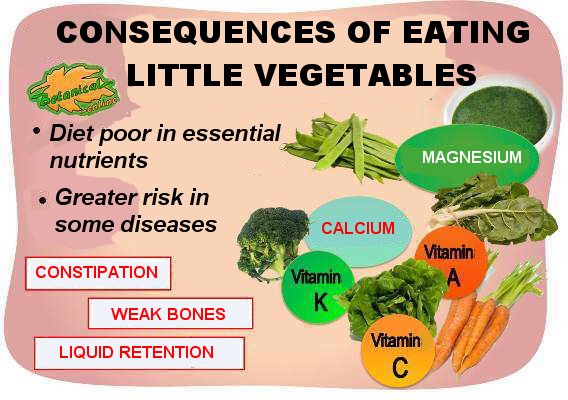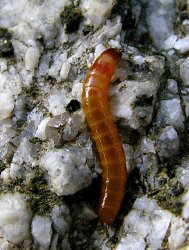Contents
- 1 What nutrients are missing if no vegetables are eaten?
- 1.1 What health problems appear when I do not eat vegetables?
- 1.2 Vegetables at the base of food?
- 1.3 What deficits do you have if you do not eat enough vegetables?
- 1.4 Other possible deficiencies because of not eating enough vegetables:
- 1.5 What diseases can cause not to eat vegetables?
- 1.6 Vegetables are specially good to keep you healthy , not only “to make you lose weight”
- 1.7 How much vegetable do you have to eat daily?
- 1.8 Do children have to eat vegetables?
What nutrients are missing if no vegetables are eaten?
What health problems appear when I do not eat vegetables?
Vegetables are necessary components of the human diet and should be consumed every day, including children. Because they provide very few calories, they seem to have less importance than other foods, but that is not the case.
There contain vitamins, minerals and other components, which are essential for health and are only found in vegetables, mainly in vegetables.

Vegetables at the base of food?
For the benefits of vegetables, more and more health organizations are recommending that this group of foods be at the base of adult nutrition.
Who said that vegetables are not very nutritious and important for health? Not eating enough vegetables can have serious consequences since there are many vitamins and minerals that are only found in abundance in this group of foods.
It would not be possible to obtain the minimum requirements of certain vitamins and minerals without eating vegetables every day.
What deficits do you have if you do not eat enough vegetables?
The main serious nutritional deficiencies that can occur due to not eating vegetables are:
- Lack of fiber in the diet
- Lack of folic acid
- Lack of vitamin A
- Lack of vitamin K
- Insufficient potassium intake: Many foods contain potassium but are not rich in this mineral. Vegetables and aromatic herbs are the foods that have the best sodium-potassium balance.
Other possible deficiencies because of not eating enough vegetables:
Besides the above serious nutritional deficiencies, if you do not eat vegetables:
- If fruits are not eaten, there is a lack of vitamin C
- It is very likely not to assume the daily requirements of magnesium and calcium if you do not eat too few legumes and nuts.

What diseases can cause not to eat vegetables?
Not eating enough vegetables can cause different health disorders, which ,if they become chronic, can cause diseases:
- Retention of liquids: a diet with little potassium favors the retention of liquids, especially if you consume foods with a lot of salt such as sausages, snacks, chips, etc.
- Muscle cramps due to deficit of electrolytes such as potassium, calcium and magnesium
- Constipation
- Problems of intestinal flora or microbiota
- High cholesterol problems
- Low levels of good cholesterol
- Bad circulation
- Hypertension
- Bad health of the heart, for all the aforementioned
- Anemia due to folate deficiency.
- Weak bones and tooth decay, vegetables are the best allies of bones!
- Excessive bleeding when cutting or nosebleeds, problems coagulating
- Premenstrual syndrome
- Dry skin
- Low defenses
- Vision problems or lack of night vision
- Problems in pregnancy
- Stones in the kidneys, ingesting little potassium is associated with increased risk of kidney stones (Potassium for the kidneys)
- Overweight or obesity , because vegetables have few calories and are satiating, so, they avoid consuming too much caloric food.
- Childhood obesity, for what was commented in the previous point.
- Cancer, because eating few vegetables may increase the risk of certain types of cancer
Vegetables are specially good to keep you healthy , not only “to make you lose weight”
Many people think that the recommendation to eat vegetables is strictly for a calorie issue, but it is not. There are vitamins, minerals and other components that are essential for health and that ONLY are found in vegetables in sufficient quantity, mainly in green leafy vegetables.
How much vegetable do you have to eat daily?
It is recommended that vegetables become the basis of food, and should be present in all meals of the day.
According to the official recommendations of the WHO (World Health Organization), the recommended daily amount of vegetables for adults is 400 g, which includes fruit consumption.
This would be, for example, a couple of carrots, a mixed salad, three pieces of fruit (whole, not in juice ) and a vegetable soup.
Do children have to eat vegetables?
Vegetables provide essential nutrients for health and therefore they are important to eat both children and adults.
It must be taken into account that children have a smaller stomach, more energy needs, and have lower micronutrient requirements than adults, therefore, they have to eat fewer vegetables and more energy foods such as rice, lentils, chickpeas , potatoes, walnuts, almonds, oatmeal, fruits, bread, etc.
It is advisable to offer daily vegetables, especially your favorites, such as carrots, tomatoes, mashed potatoes, brochettes, roasted vegetables, eggplant paté, beetroot hummus or a vegetable pie.
*Related information: Examples of healthy vegetables
![]() More information on vegetables
More information on vegetables
29 July, 2022








